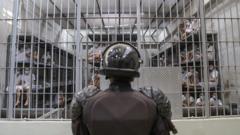Immigration advocates say a recent Supreme Court case involving a wrongly deported man from Maryland may set significant precedents for the future of US immigration law, as the Trump administration pushes back against judicial authority.
Supreme Court Weighs in on Controversial Deportation Case

Supreme Court Weighs in on Controversial Deportation Case
Legal experts argue the implications of the Trump administration's deportation policies through the case of Kilmar Abrego Garcia.
Kilmar Abrego Garcia, a man mistakenly deported to El Salvador during the Trump administration, has become the focal point of a contentious legal battle as immigration lawyers grapple with the implications of his case. Garcia was stopped by US Immigration and Customs Enforcement (ICE) while driving with his son in Maryland on March 12. Following his arrest, he was transferred to detention facilities in Louisiana and Texas, and ultimately sent to a notorious prison in El Salvador, known for housing gang members, due to what the government claimed was an "administrative error."
Now, lawyers are navigating the complexities surrounding his case, as a Maryland court has ordered his return. However, the Trump administration is claiming it cannot compel El Salvador to accept its deportee back, arguing that the judge lacked the authority for such an order. The Supreme Court has placed a temporary hold on the lower court orders while considering the administration's appeal.
Legal experts argue that the ramifications of this case could undermine due process for immigrants, particularly in the Trump era marked by strict immigration policies. Maureen Sweeney, director at the Chacón Center for Immigrant Justice at the University of Maryland, voiced that any acceptance of the administration's position could lead to a significant erosion of legal protections for immigrants.
A note from US District Judge Paula Xinis indicated that ICE officials had violated procedural requirements in the Immigration and Nationality Act. While the Fourth Circuit Court of Appeals affirmed her ruling, asserting that the US cannot unlawfully detain and deport individuals legally present in the country, the Trump administration has countered that it has no authority over El Salvador in these matters.
Nicole Hallett of the University of Chicago Law School pointed out that while US judges cannot command El Salvador to take any specific actions, they can order the US government to secure Garcia's return. She emphasized that previous cases have seen the US successfully facilitate the return of individuals deported by mistake.
Garcia’s ongoing detention in El Salvador draws attention not only because his deportation was seemingly unsupported by evidence but also due to his history as a victim of gang violence. He has a "withholding of removal" order, which protects him from being returned to El Salvador. His legal battle underscores broader issues within the immigration system, as Garcia's case reflects the intersection of administrative policy and justice in a period of heightened scrutiny over US immigration practices.
As the Supreme Court prepares to address the matter, this case is being closely monitored as a test of the limits of executive power over immigration and the vital judicial checks in place to uphold due process rights. President Trump heralded the stay on lower court orders as a win for his administration, claiming it would bolster national security, while advocacy groups warn of the broader implications for systematic immigration reforms.



















